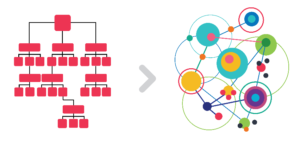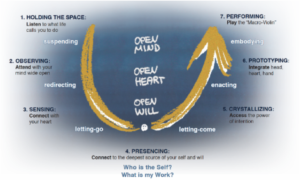Courageous Leadership from the Heart
Blog 5 of 6: Embracing self-management

Working without a recognised boss or executive director for 10 months over 2016 and 2017 was my first experience of a self-managed team and what a success it proved to be. The way we worked together changed, not by planning, not by arguments, but by each person automatically taking personal responsibility and action on what they knew their jobs were. All work got completed in a seemingly stress-free environment. Long meetings simply disappeared, replaced by quick meetings called to clarify thinking across several impacted people. We held Monday morning check-in meetings the primary intention being what was going on for each other — listening and speaking from the heart — encouraging genuine self-disclosure and attentive empathic listening. These, I later learned are an “advice process” and “way of council” recommended for self-managed teams.
There was also a big increase in encouraging each other, knowing what each other was working on, and offering help. This occurred spontaneously and I believe came from all of us opening-up to our true nature of caring and compassion.
Embracing self-management is a mindset adjustment for all and is creating the environment to let the teams get on with what needs to happen, to encourage and move responsibility to employees to act within the organisation`s higher purpose, the simplified systems (planning/budgets/governance), and culture.
This is a huge change and a natural, simple change at the same time, because it is a fundamentally different way to lead and manage our workplaces. The switch can be made in an instant, if and when the “penny drops”, but is more likely to be a process of incremental change and learning. Leaders and the workforce altering their mindsets to taking the responsibility to act towards the organisation’s purpose with compassion, empathy, consciousness, inspiration, creativity, and co-creating the environment for all to sense the action needed and to not be limited by hierarchy and authority.
Definition of self-managed teams – A self-organized, semiautonomous small group of employees whose members determine, plan, and manage their day-to-day activities and duties under reduced or no supervision.
Read more: http://www.businessdictionary.com/definition/self-managed-team.html
A shift in mindset can happen in an instant but can also be the result of deep reflection, deep listening, space to reflect, energy work, reconnecting to mind, body and soul – all of which allows the inner-journey to transform our outer ways of showing-up in the workplace. It is this that underpins self-management, agility, and learning developmental organisational cultures.
There is help out there if you are curious to know more.
A few LinkedIn profile taglines from trainers/coaches that I have found, get the idea of an inner journey across.
- Untangling the tangle. Reconnecting leaders to their innate brilliance.
- Helping stressed-out high performing leaders in tech avoid burnout, create powerful results and greater impact.
- Transforming Transformation: Quality of Mind for Organisational Change.
- Clear Mind, More Freedom, Better Performance.
- Wake the F**K up: True understanding of our feelings, thoughts and limiting beliefs allows us to live, work and play a bigger less limiting life.
These taglines are for everyone as everyone is a leader. Be it your own life, family, group event, or work role.
My own journey is getting further along my spiral of re-connecting to my inner-compass, avoiding burnout, improving the quality and clarity of my mind and waking up. The rules and regulations of “flatland” – planning, budgets, reporting, performance indicators, appraisals – using predominantly the rational, thinking brain has never fitted comfortably with me. I am waking up to “wonderland” – personal development, our spiritual growth, our zest for life, our heart’s passion, our ability to be mutually supportive, our appreciation of others as fellow human beings – and knowing that this is the way forward. Hence, this blog and my business Intandem, whose LinkedIn profile states “Helping to find a path to a better way of working. Shifting & energising mindsets, relationships and workplaces”.
A deeper understanding of self-management has also resulted from research on how organisations can learn from nature and seeing the “system” from the logic of living systems.
Nature and organisations-as-living-systems
Nature is the ultimate self-management, self-organising system. It works without hierarchy and regenerates throughout the seasons and the years.
Giles Hutchins explains this shift in the way organisations work as being from an old worldview of ‘organisation-as-machine’ to a new worldview of the ‘organisation-as-living-system’ – purposeful, vibrant, human and life-affirming.
The ‘organisation-as-living-system’ is about changing our mind-set within ourselves and in our relationships with others, so that our meeting conventions, decision-making rules, team dynamics and stakeholder relations become purposeful, authentic, and life-affirming from the inside out. Taking us from a control-and-predict culture to a living system of sense-and-respond.

Source: Giles Hutchins
All living systems inherently seek coherence. Coherence in organisations happens when all the interconnected parts are aligned with all the other parts, acting as an authentic whole. I appreciate this as I left my last job due to a lack of coherence within the organisation and where it was heading, subsequent to a new Boss taking over. He seemed to want to empire-build and be the independent champion to eliminate child labour. For stakeholders to give us the funding and leave it to us. This jarred excessively with everything I have come to understand about social change. That it is a collaborative, systemic and collective endeavour.
Otto Sharmer’s Theory U takes us through this paradigm shift to living systems self-management operations.

Today’s organisational culture is caught up in the ego-bubble of pre-conditioned concepts and biases. Little gets into the bubble from the outside. We are listening in a way that confirms what we already think we know or expect to hear.
Helen Amery’s blog explains this well. “When we think our business, industry or market is unique and special, we naturally believe that nobody else could understand the nuance of and therefore have valuable insight for it”
Adaptive organisations are extending their bubble, with more of an open mind responding to the environment to pick up new ideas from what is happening outside. We become less reactive and more adaptive with an open mind rather than a closed judgemental mind. We are in a bigger bubble but not changed from within. This reminds me of the approach of Kaizen Continuous Improvement. We strive and learn to improve current processes and systems within the organisation but are still focussed on the organisation and not the system of which it is part.
Moving to reflective, a fundamental shift takes place. Seeing ourselves within the system. We listen more deeply to others, we notice body language and even the silences, sensing the energy of the meeting/project/organisation/system. We become more conscious of what we say, how we say it, and the way to converse and share. We embrace tensions to sense deeper insights.
This is the stage of development my previous organisation was moving towards. They adapted projects, considering stakeholder views and project evaluations, added impact websites for the main funders, but were still looking at life from an independent and separate perspective. Discussions had not quite reached a stage of mutual respect and co-creating the future environment. The organisation did not engage with governments, employers’ associations and farmers in a mutually reinforcing equitable basis. Though, I believe they are going in the right direction and this will happen.
To become generative, think of the planet and nature. It basically works for life to flourish. The trees, plants and flowers grow, bloom, and wither following the seasons and regenerate year after year. They give us our oxygen and through the pollination of insects and birds provide our food. The living system looks after itself.
Generative organisations enrich us, our customers, and the wider stakeholder system -shifting organisations to being more human and more in tune with life. Some examples are:
- The circular economy – Australian start-up company Huskee produces coffee cups and lids made from coffee husks.
- Net positive – a way of doing business which puts back more into society, the environment and the global economy than it takes out.
- Zero carbon emissions – The Resurgence Trust new offices are a carbon-negative centre (EPC rating of -11) and space for education, art and music, are recent examples of this.
We need an open will, as Otto Sharmer in his Theory U puts it, to prototype a new way of being.

Source: Theory U, Otto Sharmer
Much of today’s hurry-up-and-get-on-with-it vibe, with lengthening to-do lists, rising stress in the workplace, relentless busyness and endless targets, unwittingly encourages bubble and adaptive attention. We get on with it, but this seems to be part of the problem rather than the solution. We lose our potential for creativity, empathy, blue-sky thinking and collaboration.
The aim for generative organisational culture is to nurture and nourish all the people it engages with. It becomes generative as, in turn, this stimulates people to enrich their wider circle of family, friends, associates, neighbours, stakeholders, partners, society, and the environment.
Intandem’s offer for embracing self-management
We can help you embrace the advantages of self-management for all within an organisation. Accompanying you on a journey from a control-and-predict culture to a living system of sense-and-respond.
Courageous and Conscious Leadership from the heart:
Intandem and our network of consultants can accompany you in finding clarity and quality of mind entailing individual Conscious Lives, organisational purpose and simplicity, support for the whole person, embracing self-management and collective leadership for action.
If you would like to discuss your organisation’s way forward contact chrisburton@intandem.ch
